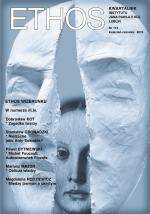Autowizerunek jako maska
Personal Image as a Mask
Author(s): Anna TylikowskaSubject(s): Social Sciences, Psychology, Sociology, Theology and Religion
Published by: Katolicki Uniwersytet Lubelski Jana Pawła II - Instytut Jana Pawła II, Wydział Filozofii
Keywords: mask; persona; self-presentation; public self-image; personal development; interpersonal relationships; culture
Summary/Abstract: The idea of personal public image that people present to others corresponds with the psychological concept of self-presentation. Theories of self-presentation concentrate on motives, strategies and effectiveness of behaviours aiming at impression management, and partly neglect deeper, complicated psychological mechanisms, mostly non-personal determinants, and far-reaching, also ethical, consequences of the creation and usage of personal image in social world. Descriptions of such mechanisms, determinants, and consequences are offered by theories of a mask or persona that were initiated by Carl Gustav Jung and are still being developed. Psychological theories of a mask, having a broader range of description and explanation than self-presentation theories, indicate and discuss a variety of determinants of constructing and using a mask, usually defined as a part of personality that represents the self in social reality. These determinants can be categorized as evolutional, existential, historical, cultural, social, and individual. The creation and usage of a mask is based on specifi c emotional, motivational, and cognitive processes. A mask is an instrument of the presentation of the self in the outer world. It protects the self. It also shapes personal image of one’s self. Wearing a mask may have various consequences, both negative and positive, all of them having an ethical aspect. The most important are: inability to build authentic relationships, inhibition of personal development, and mental disorders. The positive results of wearing a mask are mostly developmental: using a mask supports the processes of acquiring knowledge about one’s individuality and social reality. Contemporary mass societies seem to favour an ethos of creating public self-images that does not encourage developmental changes in a personal mask. Such an ethos may cause rigidness of individual masks, effecting in a low quality of life, both personal and social. In this context, Jung’s postulate to recognize one’s own mask is gaining additional ethical power.
Journal: Ethos. Kwartalnik Instytutu Jana Pawła II KUL
- Issue Year: 29/2016
- Issue No: 2
- Page Range: 61-80
- Page Count: 20
- Language: Polish
- Content File-PDF

